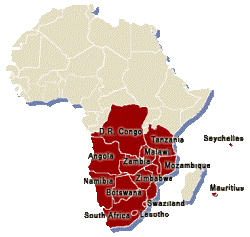Former bank of Zambia governor, Dr Caleb Fundanga, believes South Africa’s unfair trading practises are frustrating a diversified intra-regional trade in SADC.
Speaking at a Consumer Unit Trust Society International (CUTS) Zambia discussion on regional trade, Fundanga said South Africa still had a number of non-tariff barriers (NTBs) in place which prevent African products from entering the South African market. Adding that South African companies, which are dominant in a number of SADC countries, tended to favour South African products. “One example is South Africa Breweries which promotes the sale of Castle lager all over the region, but does not promote other brands even if it owns the breweries that produce beers such as the Zambian lager, Mosi which is equally a good brand.” “The scope for expanding intra-regional trade in SADC existed if only South Africa could open up more to the products of other SADC member countries.” “Intra-SADC trade between 200 and 2008 increased from US $11.6 Billion to US $29.3 Billion, but the increase was driven by the region’s shift in the source of imports from Europe to South Africa.”“Intra-regional trade has to a large extent benefitted South Africa as this country is exporting more compared to other countries in the region.”
Fundanga also cited the mining and supermarket sector as other prime examples. “South Africa has become the regional hub for many global suppliers of mining equipment which then export into the SADC region. Regarding the expansion of South African supermarket chains the region has increased the bias for South African consumer goods. Therefore showing how the increase in intra-regional trade is concentrated in one country – South Africa.” “Zambia has the potential of exporting a lot more than just copper and exporting into the region is a lot easier than exporting outside of Africa. But at this stage I believe there are a lot of obstacles that restrict the success of penetrating into the regional market which we need to overcome.” (source: TradeMark Southern Africa)






